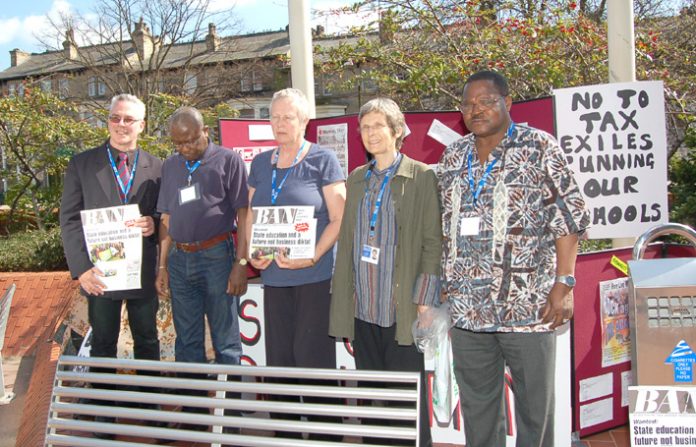
The National Union of Teachers (NUT) has said a report from the right-wing think tank Reform, has exposed the academy schools programme’s ‘real agenda’, i.e. the drive to privatise and de-unionise education.
Commenting on the report, titled ‘Response to “Academies: A Model Education?”’, NUT general secretary Steve Sinnott said today: ‘The Reform report strips away the new cuddly Academies’ image to reveal their real agenda.
‘In arguing that essential union protections should be ditched, Reform’s attack on unions takes on all teachers.
‘It is mindless and offensive and is a direct challenge not only to the teaching profession but to (education secretary) Ed Balls.
‘I urge him to respond to Reform by rejecting the report as fundamentally well off the mark.’
On Reform’s proposals for pay and conditions, Sinnott added: ‘The NUT dismisses the idea of dismantling national negotiation of pay and conditions.
‘There is already sufficient flexibility in the existing arrangements for schools to address their individual circumstances.
‘For 25,000 schools, there is nothing to be gained and everything to be lost in attempting to reinvent the wheel.’
In its press release announcing the report, Reform says: ‘The first report from within the academies movement shows that the principles of the initiative should underpin the next stage of education reform.
‘Richard Tice, Chairman of Governors at Northampton Academy, shows how freedom of management, the defining feature of academies, has transformed the culture and performance of his school.
‘He argues that the same principle should be rolled out across the whole state sector, with a particular focus on radical changes to the employment of teachers and regulations on discipline, curriculum and performance tables.’
Reform claims that the report ‘is the first description of the practical effects of academy status since the programme’s inception in 2000.’
Reform adds: ‘Richard Tice shows that much greater freedom of management has transformed the school leadership’s ability and willingness to take decisions.
‘Specific improvements have included changes to the teaching and management staff and several changes to discipline policy including a new off-site centre for excluded pupils.’
Calling for more deregulation and local pay, the think tank says: ‘Richard Tice argues that the lessons of this experience should inform the next stage of education reform.
‘Government needs to improve the academy model by removing the Independent Appeals Panels and reducing the role of central initiatives such as the National Curriculum, performance tables and tests.
‘There is also a challenge for the wider education system, in particular the teaching unions whose cultural power is huge.
‘The unions should transform their role from a blocker of reform to becoming a positive driver of change.
‘Government should roll out the improved academy programme to the majority of state schools.
‘This would mean that all schools would be responsible for setting teachers’ pay and conditions locally, a key lever for driving up teaching quality.
‘The benefits would include better senior managers in schools on higher salaries, schools that resemble successful businesses and more motivated pupils and teachers.’
‘Selected statements’ by Richard Tice include:
On management freedom:
‘It has increasingly become clear to me that the freedom of the independent management structure devised for academies is the main driver to their success, where so many others have failed to manage these schools beforehand.
‘Whilst the new facilities and buildings are an important, much needed addition in a deprived inner urban area, they do not on their own improve overall performance.
‘This comes from the management and leadership.’
On Government regulation:
‘Far too much time in a pupil’s career is spent preparing for government ordered exams and assessments, with the knock on effect that their creativity, and enjoyment of subjects, is stifled.
‘Fewer changes, testing, fixed coursework and exams would free up more teacher time for pupils’ individual learning targets.’
On the teaching unions:
‘The extent to which the influence of teaching unions permeates the whole of the schools’ activity was surprising to me.
‘I should not have been surprised, given the manner in which teachers’ terms and conditions are organised and negotiated.
‘Teachers’ conditions of service are agreed at a national level between employers and teaching unions . . .
‘In practice these agreements have enabled unions to be the blockers of reform, instead of organisations that support teachers to do a good job.’
Elizabeth Truss, Reform’s Deputy Director, said: ‘The current cross-party support for the academy programme is only the beginning of what is needed to transform the standards of state education in England.
‘Academies still do not function as fully independent schools within the state sector and current plans will restrict their number to 13 per cent of secondary schools.
‘Progress so far shows that policy makers can be much more confident about tackling the barriers to education reform.’
This right-wing think tank has unwittingly done a service in spelling out the hatred of trade unions as a block to privatisation and maximising profits.
But teaching unions must not just criticise the ‘real academy agenda’, but recognise that this is the government’s privatisation vehicle and must call national strike action to smash privatisation.
To do this will mean building a new leadership in the unions that will take on and defeat this government and go forward to a workers government and socialism.
This is the way forward to defend and improve free education for all.